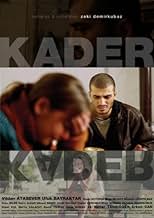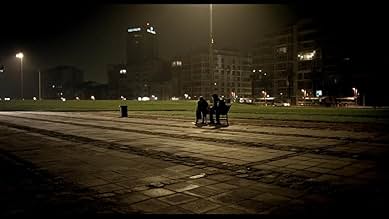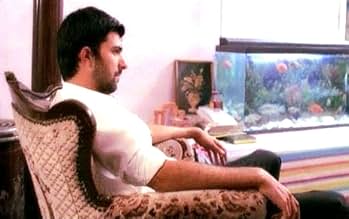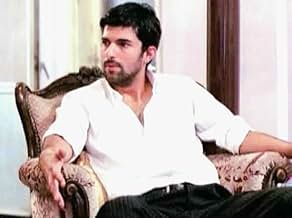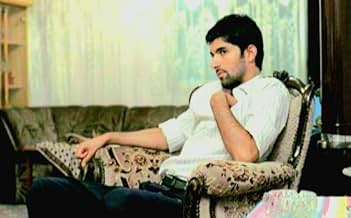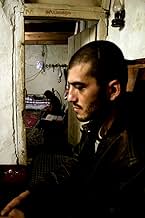Kader
- 2006
- 1 Std. 43 Min.
IMDb-BEWERTUNG
7,7/10
18.734
IHRE BEWERTUNG
Füge eine Handlung in deiner Sprache hinzuBekir loves Ugur, who loves Zagor, who is about to get out of jail. An already tense love triangle is thrown into turmoil on a hot summer night, when Zagor kills someone, and Ugur disappears... Alles lesenBekir loves Ugur, who loves Zagor, who is about to get out of jail. An already tense love triangle is thrown into turmoil on a hot summer night, when Zagor kills someone, and Ugur disappears.Bekir loves Ugur, who loves Zagor, who is about to get out of jail. An already tense love triangle is thrown into turmoil on a hot summer night, when Zagor kills someone, and Ugur disappears.
- Auszeichnungen
- 10 Gewinne & 9 Nominierungen insgesamt
Apo Demirkubuz
- Muzo
- (as Abdullah Demirkubuz)
Empfohlene Bewertungen
Conceived as a prequel to MASUMİYET (1997), KADER (DESTINY) focuses on an impossible love-affair between Bekir (Ufuk Bayraktar) and Uğur (Vildan Atasever) that begins in the seedier areas of Beyoğlu in İstanbul and remains unfinished in the snowy wastes of Kars in the east of the Republic of Turkey.
The sentiments expressed are redolent of the Yeşilçam melodramas that hitherto have formed a backdrop to many of Demirkubuz's movies. Bekir leaves his wife Emine (Güzin Alkan) and children on at least two occasions to pursue Uğur all around the country, despite the hopelessness of his quest. Uğur remains in love with habitual criminal Zagor (Ozan Bilen), who is transferred from prison to prison following a series of attacks on police officers, wardens and fellow inmates. Uğur keeps telling Bekir to go home, but he keeps reappearing in her life at the most inopportune moments; in the Black Sea port of Sinop, for example, she is evicted from her hotel room as Bekir clamors to see her. The ill-matched couple finally fetch up at a mud-brick house in Kars; nothing is resolved (which subverts the Yeşilçam convention).
Demirkubuz invests this story with gritty social realism. Uğur grows up in a violent environment where women are routinely treated as sex-objects with little power of self-determination. She cannot quite grasp the fact that Bekir lacks the outward strength to conform to her expectations of all men. Bekir likes to exchange sex-talk with his male friends, but hardly conforms to the image of masculinity that prevails in his immediate surroundings, that is based on power and aggression. It is the kind of world where Uğur's mother's boyfriend Cevat (Engin Akyürek) is knifed to death in a kıraathane (coffee-house), simply for causing an argument.
In this kind of environment where such feelings as love and tenderness mean nothing, it's hardly surprising that the central love-affair remains unfulfilled. Bekir must shoulder some of the blame for this; at one point he vividly describes how he made love to Uğur on the first occasion they met. In truth he was almost embarrassed in her presence, unable to speak or communicate properly and falling in love with her photograph. Yet the admission of such emotions is considered "unmanly," something that Bekir is keen to avoid.
On at least three occasions the protagonists refer to destiny directing their lives: Uğur cannot help but pursue Zagor, despite his propensity for being imprisoned, while Bekir cannot avoid pursuing Uğur all round the country, even if by doing so he enters "another world," in which marriage, home and family (the traditional symbols of social and moral stability) no longer matter. We might disagree with the protagonists' analysis - to a large extent their decisions are made of their own free will - but we nonetheless understand quite tangibly how their characters have been shaped by the harsh environment in which they have grown up. This is the fundamental socio-economic point that KADER makes; if the families showed more concern for their members and their collective futures, then perhaps the world might be a less unforgiving place.
The sentiments expressed are redolent of the Yeşilçam melodramas that hitherto have formed a backdrop to many of Demirkubuz's movies. Bekir leaves his wife Emine (Güzin Alkan) and children on at least two occasions to pursue Uğur all around the country, despite the hopelessness of his quest. Uğur remains in love with habitual criminal Zagor (Ozan Bilen), who is transferred from prison to prison following a series of attacks on police officers, wardens and fellow inmates. Uğur keeps telling Bekir to go home, but he keeps reappearing in her life at the most inopportune moments; in the Black Sea port of Sinop, for example, she is evicted from her hotel room as Bekir clamors to see her. The ill-matched couple finally fetch up at a mud-brick house in Kars; nothing is resolved (which subverts the Yeşilçam convention).
Demirkubuz invests this story with gritty social realism. Uğur grows up in a violent environment where women are routinely treated as sex-objects with little power of self-determination. She cannot quite grasp the fact that Bekir lacks the outward strength to conform to her expectations of all men. Bekir likes to exchange sex-talk with his male friends, but hardly conforms to the image of masculinity that prevails in his immediate surroundings, that is based on power and aggression. It is the kind of world where Uğur's mother's boyfriend Cevat (Engin Akyürek) is knifed to death in a kıraathane (coffee-house), simply for causing an argument.
In this kind of environment where such feelings as love and tenderness mean nothing, it's hardly surprising that the central love-affair remains unfulfilled. Bekir must shoulder some of the blame for this; at one point he vividly describes how he made love to Uğur on the first occasion they met. In truth he was almost embarrassed in her presence, unable to speak or communicate properly and falling in love with her photograph. Yet the admission of such emotions is considered "unmanly," something that Bekir is keen to avoid.
On at least three occasions the protagonists refer to destiny directing their lives: Uğur cannot help but pursue Zagor, despite his propensity for being imprisoned, while Bekir cannot avoid pursuing Uğur all round the country, even if by doing so he enters "another world," in which marriage, home and family (the traditional symbols of social and moral stability) no longer matter. We might disagree with the protagonists' analysis - to a large extent their decisions are made of their own free will - but we nonetheless understand quite tangibly how their characters have been shaped by the harsh environment in which they have grown up. This is the fundamental socio-economic point that KADER makes; if the families showed more concern for their members and their collective futures, then perhaps the world might be a less unforgiving place.
Demirkubuz was always going to have a hard time matching the brilliance of 'Masumiyet'. While 'Kader' is a good piece of work, you cant help but feel he was trying too hard to recreate the 'Masumiyet' magic here.
The biggest problem I had with the film was how characters were built up and dropped like hot potatoes somewhere along the way with their fates left unresolved. Case in point. A significant portion of the film's first half deals with Ugur's dysfunctional family- her father's state of illness, her mother's desperation, her brother's self esteem issues etc. However at the halfway point, these characters simply disappear off the radar and the film moves on as of they never existed in the first place.
Script and pacing issues aside, the other main weakness here is the lead actor Bayraktar who I thought was very wooden. He seemed to be simply reading the lines off the script without actually getting into the character. When he does attempt to stop brooding and display emotion, it comes across as artificial and forced. About the rest of the cast. Vildan Atasever, the lead actress, does quite well playing 'Ugur', but I felt her character was underwritten in the script. I must say that she reminded me of Itir Esen in this film- the resemblance is uncanny. A special mention must go to the actress who plays Bekir's (ex?)-wife. I thought she brought real emotional depth and complexity to her character. More of her would have really influenced the film in a positive way.
A lot of people have been disconcerted by the abundant swearing in the film but I didn't find it to be much of an issue. I appreciated the dark tone which was carried on from 'Masumiyet'. The camera angles are often static and Demirkubuz prolongs scenes which give it an unpolished natural feel.
Let me conclude by saying that 'Kader' is quite well made, but its missing that extra emotional oomph that 'Masumiyet' had
The biggest problem I had with the film was how characters were built up and dropped like hot potatoes somewhere along the way with their fates left unresolved. Case in point. A significant portion of the film's first half deals with Ugur's dysfunctional family- her father's state of illness, her mother's desperation, her brother's self esteem issues etc. However at the halfway point, these characters simply disappear off the radar and the film moves on as of they never existed in the first place.
Script and pacing issues aside, the other main weakness here is the lead actor Bayraktar who I thought was very wooden. He seemed to be simply reading the lines off the script without actually getting into the character. When he does attempt to stop brooding and display emotion, it comes across as artificial and forced. About the rest of the cast. Vildan Atasever, the lead actress, does quite well playing 'Ugur', but I felt her character was underwritten in the script. I must say that she reminded me of Itir Esen in this film- the resemblance is uncanny. A special mention must go to the actress who plays Bekir's (ex?)-wife. I thought she brought real emotional depth and complexity to her character. More of her would have really influenced the film in a positive way.
A lot of people have been disconcerted by the abundant swearing in the film but I didn't find it to be much of an issue. I appreciated the dark tone which was carried on from 'Masumiyet'. The camera angles are often static and Demirkubuz prolongs scenes which give it an unpolished natural feel.
Let me conclude by saying that 'Kader' is quite well made, but its missing that extra emotional oomph that 'Masumiyet' had
We don't get Turkish films in Australia, apart from the odd festival piece. We have to wait for the DVDs to arrive or to be sent by relatives. I have just seen Kader.
How interesting it is that characters and reviewers alike talk about Bekir's love for Ugur. In every culture, there is a degree of confusion where love ends and obsession begins, but in my experience it has always been a particular Mediterrenean/Balkan disease. The director, very skillfully, conveys that in an environment where all conviction is hopeless dedicating a life to a person makes as much sense as any other formula for living. Bekir's obsession for Ugur intensifies because of, not despite, her rejection of him. However, the film is much more than a doomed love story. It is at once an exploration of alienation of youth, a study of roots of violence and a critique of machismo culture. Bekir's character reminded me a line from a well-known Turkish poem: "Like a pain without a body / seeking an organ to attach itself" (my translation, my apologies to purists). In reality, the line applies to all the major characters in the film. Much criticised ending is perfect, in my opinion. I cannot imagine a better way to end this important addition to modern Turkish cinema.
How interesting it is that characters and reviewers alike talk about Bekir's love for Ugur. In every culture, there is a degree of confusion where love ends and obsession begins, but in my experience it has always been a particular Mediterrenean/Balkan disease. The director, very skillfully, conveys that in an environment where all conviction is hopeless dedicating a life to a person makes as much sense as any other formula for living. Bekir's obsession for Ugur intensifies because of, not despite, her rejection of him. However, the film is much more than a doomed love story. It is at once an exploration of alienation of youth, a study of roots of violence and a critique of machismo culture. Bekir's character reminded me a line from a well-known Turkish poem: "Like a pain without a body / seeking an organ to attach itself" (my translation, my apologies to purists). In reality, the line applies to all the major characters in the film. Much criticised ending is perfect, in my opinion. I cannot imagine a better way to end this important addition to modern Turkish cinema.
Zeki Demirkubuz has his personal cinema aspect as the other legends and this view makes this movie the unique movie in the History of Turkish Cinema.
The leading role is the most important role in this movie because of his ability of show how normal Turkish guys love.
Also the movie show us how can a man ruin his and his family's life. The issue looks like ordinary,simple and routine but the director shows how important issue it is. Camera views , sound , dialogs are great Zeki Demirkubuz will be a legend in a few years. Original, different, extraordinary, must see..
The leading role is the most important role in this movie because of his ability of show how normal Turkish guys love.
Also the movie show us how can a man ruin his and his family's life. The issue looks like ordinary,simple and routine but the director shows how important issue it is. Camera views , sound , dialogs are great Zeki Demirkubuz will be a legend in a few years. Original, different, extraordinary, must see..
If movie art would be mentioned as a football game, i would assume Demirkubuz as Johan Cruyff. I think Kader is the best example of the simple and fascinating character of Turkish Movie. Simplicity is the key word not only of Demirkubuz and Cruyff, but also of being expressive directly in movie art.
In the final part of film, the speech of Bekir is like the bullet of the speech of Frank (Denis Hopper) of Blue Velvet, it had its place in deepest part of my heart.
If we should make a choose of a masterpiece, Kader is the first candidate with its original and impressive language.
In the final part of film, the speech of Bekir is like the bullet of the speech of Frank (Denis Hopper) of Blue Velvet, it had its place in deepest part of my heart.
If we should make a choose of a masterpiece, Kader is the first candidate with its original and impressive language.
Wusstest du schon
- WissenswertesIn the first scene of Irfan's hotel, Bekir salutes Irfan and they watch Masumiyet (1997) on TV, which is sequel of this movie. In a way, Bekir witnesses his future with Ugur.
- PatzerWhile Bekir is cutting Ugur's photo the tea glass is nearly empty, but then he looks in the photo he cut and half of the glass is full.
- VerbindungenFollows Masumiyet (1997)
- SoundtracksMeditations
Written and performed by Eduard Artemyev
Courtesy of Electroshock Records
Cleared by Rh Pozitif Publishing
Top-Auswahl
Melde dich zum Bewerten an und greife auf die Watchlist für personalisierte Empfehlungen zu.
- How long is Destiny?Powered by Alexa
Details
Box Office
- Weltweiter Bruttoertrag
- 122.904 $
- Laufzeit1 Stunde 43 Minuten
- Farbe
- Sound-Mix
Zu dieser Seite beitragen
Bearbeitung vorschlagen oder fehlenden Inhalt hinzufügen


